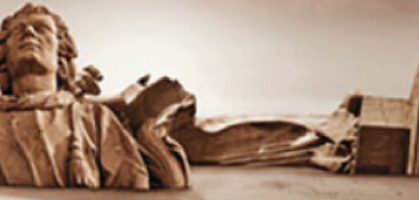And when Ibrahim and Ismail raised the foundations of the House: Our Lord! accept from us;

Ibraheem was born at a time when the king Namrud was told by astrologers that a child who would take over his city would be born. His mum hid him in a cave because Namrud had been told by astrologers that a child would be born who would bring a new religion. At 13 years, Ibraheem leaves the cave and comes to the city of Kuthaa. He debated with the people about their worshipping idols, the sun. moon and stars. Their economy was reliant on idols and they were offended. When he broke their idols with a catapult, they flung him into a large fire which was made cold and peaceful for him.
Sarah gave him a slave girl called Hajra who gave him his first son Ismaail. It upset Sarah, and Allah advised Ibraheem to take Hajra and Ismaeel to Bakka. Leaving them in Allah’s care, he returned to Sarah. The well of Zam Zam ensured that the city of Makka became a prominent place. Ibraheem visits his son and is asked to sacrifice him. Both father and son agree but when he draws the blade, a ram is substituted and Ismaail is safe. Divinity had accepted his submission. We celebrate Eid-ul-Hajj (Adha) commemorating this sacrifice of Ibrahim (pbuh) Prophet Ibrahim and Ismaail restore the Ka’ba near the grave of Hajra who had died. The place where he stood is known as Maqame Ibrahim. Allah softened the rock he was standing on to mould his footprints. Another son is born, this time to Sarah and they call him Is-haaq. He is called the father of the Prophets because from his son Ismaail came the Arab Prophets, including Prophet Muhammad, and from his son Is-haaq came the Prophets of Bani Israil including Prophet Isa. The title of Prophet Ibraheem (pbuh) was “Khalilullah”, which means “Friend of Allah”. When the time came for his death, he told the angel of death: “Ask Allah if a friend kills his friend?'” The angel of death, Izrail, could not answer this question, so he returned to Allah, Who commanded him to go back to Ibraheem (pbuh) and say: “O Ibrahim, does a friend refuse to return to his friend?”

